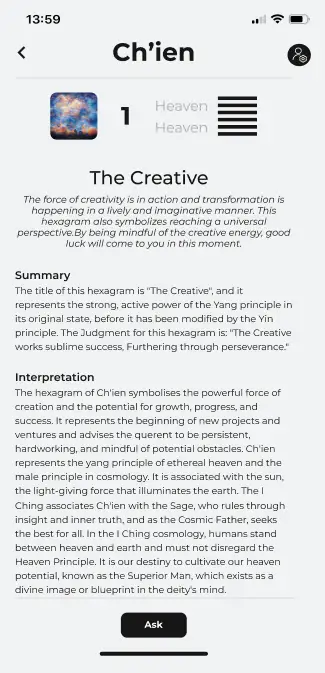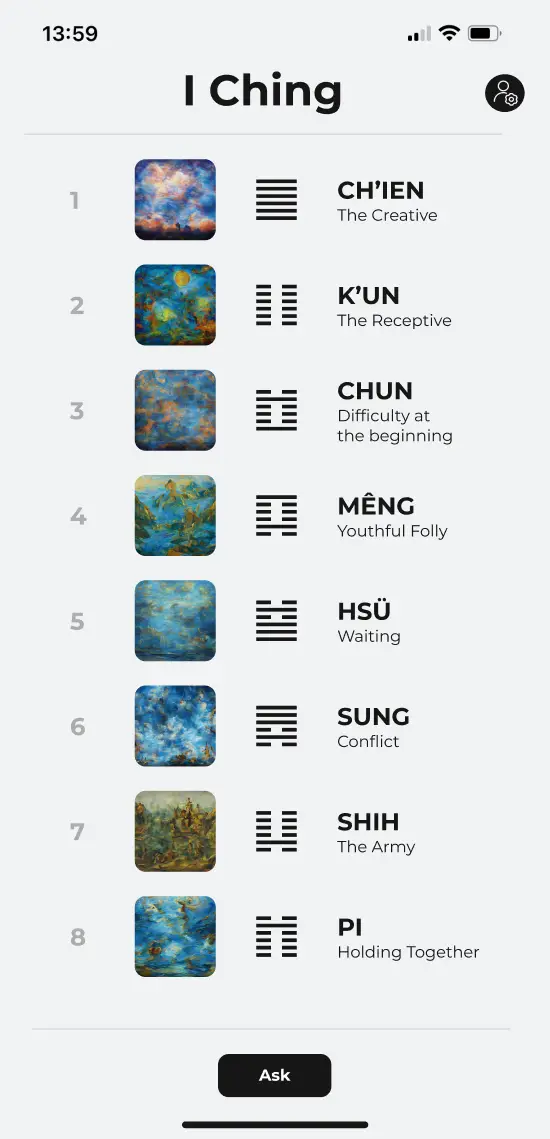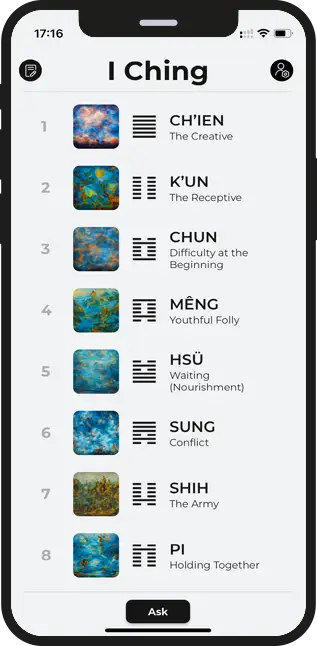
Fire
Mountain
Hexagram 56 - The Wanderer - LÜ
Trusting the unknown can be daunting, as we are all travellers on this journey of life. However, those who walk alongside the Sage find comfort in knowing they are protected from harm. The Sage acts as a guide, illuminating the path ahead and providing a sense of direction to those who seek it.
Summary
This hexagram represents a wanderer state, which can mean physical wandering or a mental state of uncertainty and searching. It speaks of a time of transition, change, and the need for inner strength and determination to overcome challenges and find their way. The key takeaways from the Judgment and image include the importance of inner strength and self-reliance and the need to stay true to oneself and not be swayed by external influences.
Interpretation
Hexagram 56 reminds us that we are all wanderers in the unknown universe, searching for meaning and direction in our lives. The I Ching advises us to remain self-reliant and persistent, to overcome challenges and stay true to our inner selves. However, we must also remain modest and unassuming, recognising our dependence on the Higher Power to guide us through life's events.
If we look to others or external factors for our security and success, we may lose the protection and guidance of the Sage. Our relationship with the Creative determines our fate and whether we are in harmony with universal justice and truth. Even the slightest deviation from this path can result in isolation from the Higher Power and Cosmic punishment.
To avoid lawsuits and conflicts with others, we must let go of negative mental fixations and approach others with tolerance and generosity. By serving the innocent and the good, we stay in step with the Sage and avoid wandering alone.
Hexagram 56 represents a journey of self-discovery and becoming one's true self. It reminds us to be cautious and reserved yet persistent and self-reliant. The concept of wandering in Chinese culture is associated with seeking knowledge and experience. At the same time, the hexagram has also been associated with the experience of exile and the need to return to one's true self.
Sage Advice
The wanderer provides advice to stay true to oneself and not be swayed by external influences, to be self-reliant, to have inner strength, and to be persistent and overcome challenges. It advises being careful not to be swayed by temptation and losing one's way. Please focus on the inner journey, stay true to yourself, and not be swayed by external influences; trust in yourself and have inner strength and determination to overcome any challenges. This will help one to navigate and overcome difficulties and find one's true path.
Line 1
The wise wanderer must be mindful of how they use their time and energy and not get distracted by trivial or inferior things. It is important to focus on what is essential and correct and to prioritise our responsibilities and duties. It reminds us to stay true to our purpose and to avoid wasting our energy on things that do not serve our higher goals. The line speaks to the importance of focus and mindfulness. We must be aware of how we use our time and energy and not get distracted by things that do not serve our higher purpose. In a world of distractions and trivialities, losing sight of what truly matters can be easy. It reminds us to stay grounded, focused on what is essential, and avoid getting caught up in gossip, petty concerns, or other distractions that can lead us astray.
Line 2
Suggests that a modest and generous spirit is critical to finding a place of rest and gaining the support of loyal friends. By focusing on the good in others and helping to liberate them from their fears and ego, one can win their allegiance to what is good. This line also reminds us not to be motivated by a personal gain in our pursuits, as this can lead to envy and distrust. Instead, we should remain conscientious and focused on the greater good to receive help from the inner world and the support of steadfast friends.
Line 3
The wanderer's resting place is lost when they act with ego and meddle in the affairs of others. Bullying and arrogant attitudes will not lead to success. Abandoning our responsibilities and disregarding our inner world obligations shows disrespect towards the Sage, and we may lose their protection. The half-hearted acceptance of our tasks is a sign of our ego's intrusion, causing our will to collapse. Understanding how things work and allowing them to progress naturally is essential to overcome this assault. Seeking answers from the Sage during the inner conflict, driven by emotions rather than truth-seeking, will not provide rational answers. To progress, we must let go of internal conflicts, return to a path of humility and acceptance, and trust the Creative.
Line 4
The wanderer's heart is heavy. Even though we try to hide our desires, they still impact us, and we must guard against their negative influence. When we doubt our path, we may become tempted to interfere or act carelessly, thinking our actions won't matter. In such situations, the Sage cannot offer assistance. As strangers in an unfamiliar place, we must be attentive to our inner thoughts and feelings. The line suggests that the wanderer's heart is weighed down by the pressure of desires that are not aligned with their path. This may cause them to act impulsively or carelessly, thinking their actions won't matter. The line reminds us that we must guard against the negative influence of such desires and pay close attention to our inner thoughts and feelings. Only by following the guidance of the Sage and letting go of our ambitions and fears can we find peace of mind and ease on our journey.
Line 5
He shoots a pheasant. The "pheasant" here can represent anything we are overly attached to or fixated on, be it an idea, possession, or relationship. This line suggests that to make progress; we must be willing to let go of these attachments, even if they bring us temporary pleasure or comfort. By "shooting" the pheasant, we symbolically release ourselves from its hold and gain the humility and detachment necessary to move forward with greater ease. This requires inner and outer correctness, meaning we must align our thoughts and actions with our true values and intentions. When we approach life with humility and generosity and let go of our ego-driven desires, we open ourselves to tremendous success and good fortune.
Line 6
Can also be interpreted as a warning against complacency. The wandering path is not one of comfort; if we become too comfortable in our progress, we risk losing all we have gained. The burning of the bird's nest in this line represents the loss of our spiritual home and protection, which can occur if we become careless and neglect our inner work. We must remain vigilant and committed to the wanderer's path, always seeking to deepen our understanding and connection to the divine. With this constant attention and dedication, we can continue progressing on our journey and avoid the pitfalls of complacency and carelessness.








